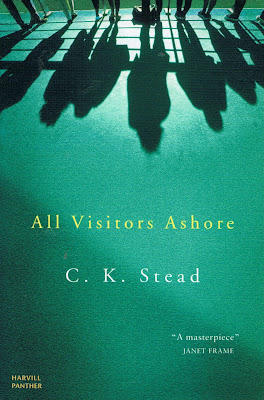In 1955 Janet Frame went to live in an old army hut in the garden of Frank Sargeson's bach in Esmonde Road, Takapuna, Auckland, New Zealand. Karl Stead (who publishes as C. K. Stead) and his wife Kay were frequent visitors there. Thirty years later Stead, an academic and a creative writer, wrote All Visitors Ashore, which is a fictionalized account of some of the characters and events that took place in that social circle at the time.
But Stead sets the novel in 1951, a crucial year in the politics of New Zealand, when the waterfront dispute was dominating the news. This forms the backcloth to the story, whose main character is the young academic writer Curl Skidmore (similar to C. K. Stead, whose first and last initals he shares), who goes to see the fiftyish artist Melior Farbro, who is gay, grows vegetables, has a limp, and is very fond of Ken Clayburn who likes the horses (similar to the writer Frank Sargeson, who had a longtime friend Harry Doyle who used to train horses), and Cecilia Skywards, who is living in Frank's hut in the garden and used to live in a convent but not really as it was a mental hospital, and is writing a novel called Memoirs of a Railway Siding (similar to Janet Frame, whose father was a railway worker, although the novel was Owls Do Cry).
Often, the style the novel is written in is what can be described as modernist (Stead's PhD was on modernism) in that the breathless, very long and often sparsely punctuated sentences are internal monologues revealing a person's thoughts. Characters are frequently addressed as 'you', and the modernism often tips into postmodernism by the way the book selfconsciously sees itself being written, or the way the narrator, for instance in the post-abortion scene on the beach, has a conversation with Curl as he goes to get rid of the embryo remains in a jerry borrowed from his neighbour Nathan.
The book is funny and serious, farcical and tragic, ostentatiously clever but never infuriating. It's pretentious, sure, but what's wrong with that: some of the world's greatest writers are pretentious. Stead may not be among the greatest writers, but he's very good all the same.
Cecilia doesn't exactly come across in an wonderful light, but then Stead seems to have nurtured a mild twenty-year grudge against Frame for her short story 'The Triumph of Poetry', published in The Reservoir in 1964. Frame claimed that in this story (which concerns a prematurely balding academic whose life is in some respects similar to Stead's) she took her former Otago University teacher Gregor Cameron and the (invented) poet Karl Waikato for her inspiration, but the Steads found it too close to home for comfort. Frame had no complaints about the delayed retaliation.




No comments:
Post a Comment